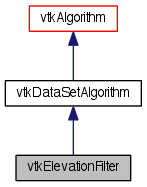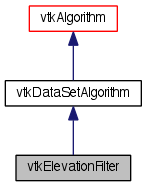generate scalars along a specified direction More...
#include <vtkElevationFilter.h>


Detailed Description
generate scalars along a specified direction
vtkElevationFilter is a filter to generate scalar values from a dataset. The scalar values lie within a user specified range, and are generated by computing a projection of each dataset point onto a line. The line can be oriented arbitrarily. A typical example is to generate scalars based on elevation or height above a plane.
- Examples:
- vtkElevationFilter (Examples)
Definition at line 37 of file vtkElevationFilter.h.
Member Typedef Documentation
Reimplemented from vtkDataSetAlgorithm.
Definition at line 41 of file vtkElevationFilter.h.
Constructor & Destructor Documentation
| vtkElevationFilter::vtkElevationFilter | ( | ) | [protected] |
| vtkElevationFilter::~vtkElevationFilter | ( | ) | [protected] |
Member Function Documentation
| static vtkElevationFilter* vtkElevationFilter::New | ( | ) | [static] |
Create an object with Debug turned off, modified time initialized to zero, and reference counting on.
Reimplemented from vtkDataSetAlgorithm.
| static int vtkElevationFilter::IsTypeOf | ( | const char * | name | ) | [static] |
Return 1 if this class type is the same type of (or a subclass of) the named class. Returns 0 otherwise. This method works in combination with vtkTypeMacro found in vtkSetGet.h.
Reimplemented from vtkDataSetAlgorithm.
| virtual int vtkElevationFilter::IsA | ( | const char * | name | ) | [virtual] |
Return 1 if this class is the same type of (or a subclass of) the named class. Returns 0 otherwise. This method works in combination with vtkTypeMacro found in vtkSetGet.h.
Reimplemented from vtkDataSetAlgorithm.
| static vtkElevationFilter* vtkElevationFilter::SafeDownCast | ( | vtkObjectBase * | o | ) | [static] |
Reimplemented from vtkDataSetAlgorithm.
| virtual vtkObjectBase* vtkElevationFilter::NewInstanceInternal | ( | ) | const [protected, virtual] |
Reimplemented from vtkDataSetAlgorithm.
Reimplemented from vtkDataSetAlgorithm.
| void vtkElevationFilter::PrintSelf | ( | ostream & | os, |
| vtkIndent | indent | ||
| ) | [virtual] |
Methods invoked by print to print information about the object including superclasses. Typically not called by the user (use Print() instead) but used in the hierarchical print process to combine the output of several classes.
Reimplemented from vtkDataSetAlgorithm.
| virtual void vtkElevationFilter::SetLowPoint | ( | double | , |
| double | , | ||
| double | |||
| ) | [virtual] |
Define one end of the line (small scalar values). Default is (0,0,0).
| virtual void vtkElevationFilter::SetLowPoint | ( | double | [3] | ) | [virtual] |
Define one end of the line (small scalar values). Default is (0,0,0).
| virtual double* vtkElevationFilter::GetLowPoint | ( | ) | [virtual] |
Define one end of the line (small scalar values). Default is (0,0,0).
| virtual void vtkElevationFilter::GetLowPoint | ( | double | data[3] | ) | [virtual] |
Define one end of the line (small scalar values). Default is (0,0,0).
| virtual void vtkElevationFilter::SetHighPoint | ( | double | , |
| double | , | ||
| double | |||
| ) | [virtual] |
Define other end of the line (large scalar values). Default is (0,0,1).
| virtual void vtkElevationFilter::SetHighPoint | ( | double | [3] | ) | [virtual] |
Define other end of the line (large scalar values). Default is (0,0,1).
| virtual double* vtkElevationFilter::GetHighPoint | ( | ) | [virtual] |
Define other end of the line (large scalar values). Default is (0,0,1).
| virtual void vtkElevationFilter::GetHighPoint | ( | double | data[3] | ) | [virtual] |
Define other end of the line (large scalar values). Default is (0,0,1).
| virtual void vtkElevationFilter::SetScalarRange | ( | double | , |
| double | |||
| ) | [virtual] |
Specify range to map scalars into. Default is [0, 1].
| void vtkElevationFilter::SetScalarRange | ( | double | [2] | ) |
Specify range to map scalars into. Default is [0, 1].
| virtual double* vtkElevationFilter::GetScalarRange | ( | ) | [virtual] |
Specify range to map scalars into. Default is [0, 1].
| virtual void vtkElevationFilter::GetScalarRange | ( | double | data[2] | ) | [virtual] |
Specify range to map scalars into. Default is [0, 1].
| int vtkElevationFilter::RequestData | ( | vtkInformation * | , |
| vtkInformationVector ** | , | ||
| vtkInformationVector * | |||
| ) | [protected, virtual] |
This is called within ProcessRequest when a request asks the algorithm to do its work. This is the method you should override to do whatever the algorithm is designed to do. This happens during the fourth pass in the pipeline execution process.
Reimplemented from vtkDataSetAlgorithm.
Member Data Documentation
double vtkElevationFilter::LowPoint[3] [protected] |
Definition at line 72 of file vtkElevationFilter.h.
double vtkElevationFilter::HighPoint[3] [protected] |
Definition at line 73 of file vtkElevationFilter.h.
double vtkElevationFilter::ScalarRange[2] [protected] |
Definition at line 74 of file vtkElevationFilter.h.
The documentation for this class was generated from the following file:
- dox/Filters/Core/vtkElevationFilter.h
 1.8.0
1.8.0